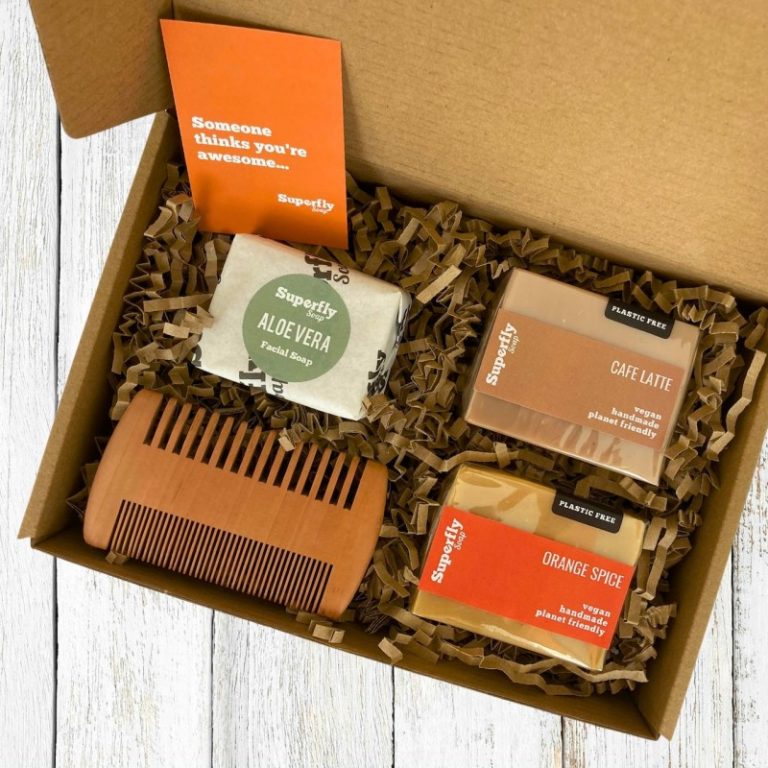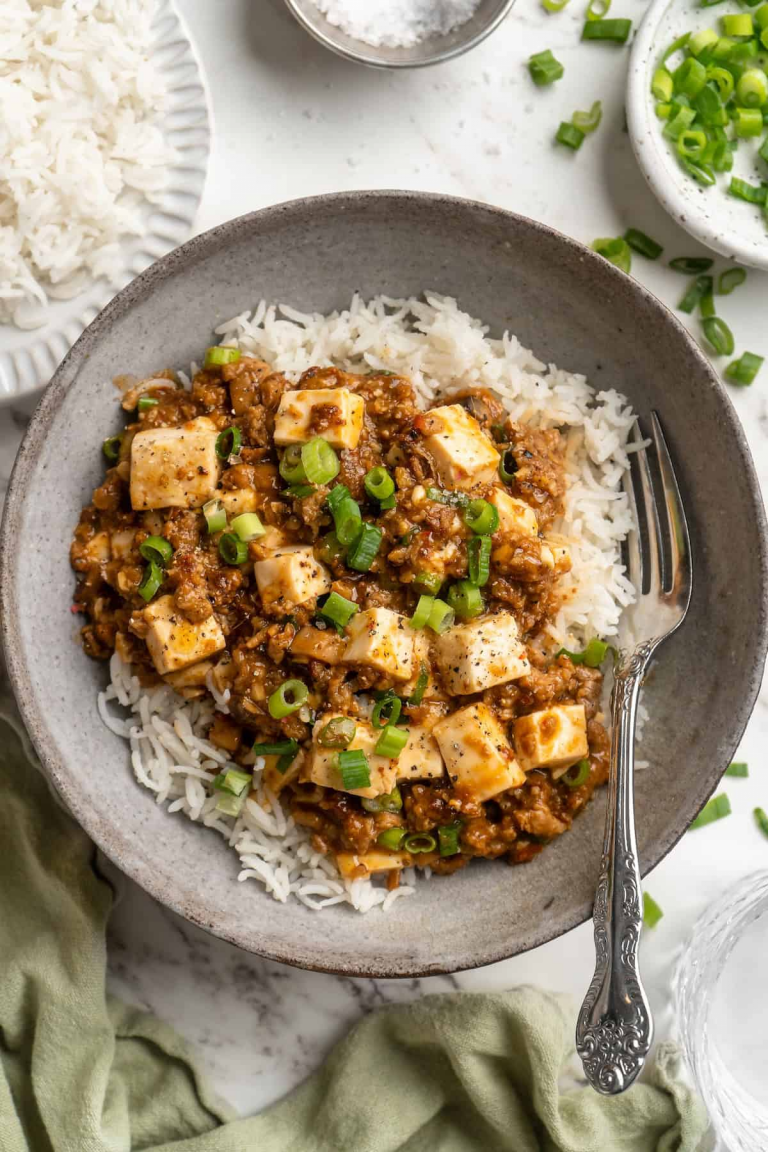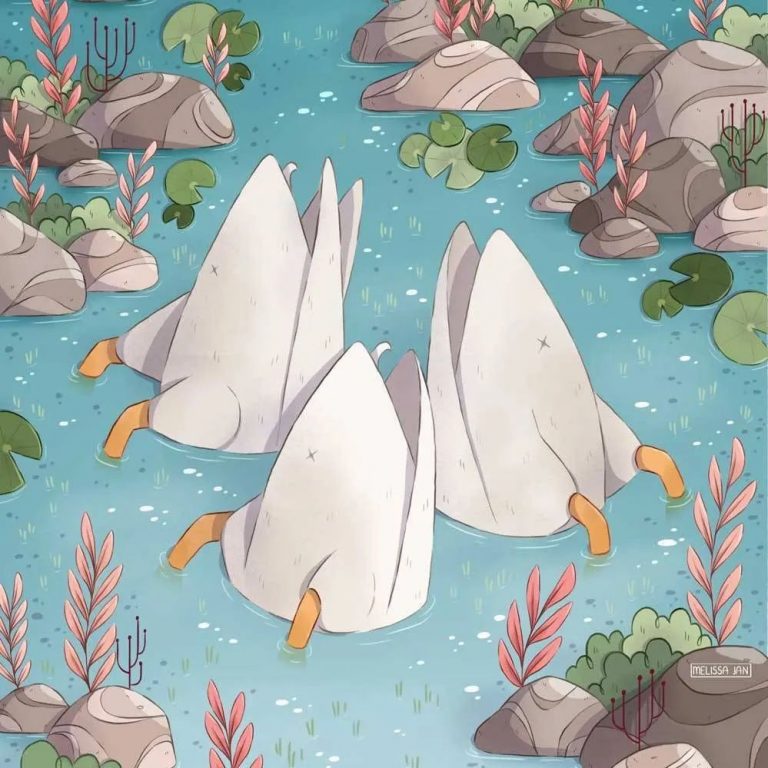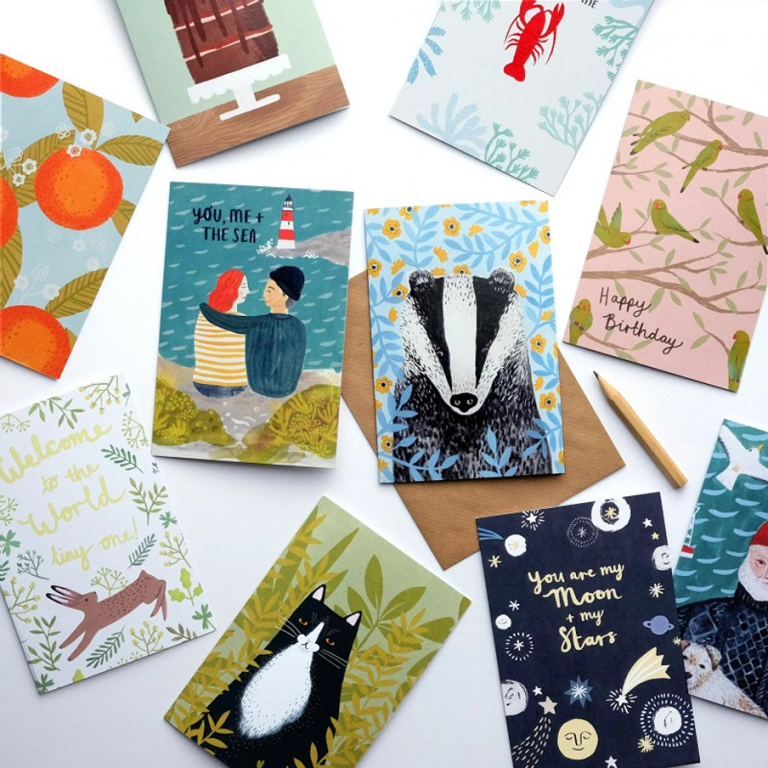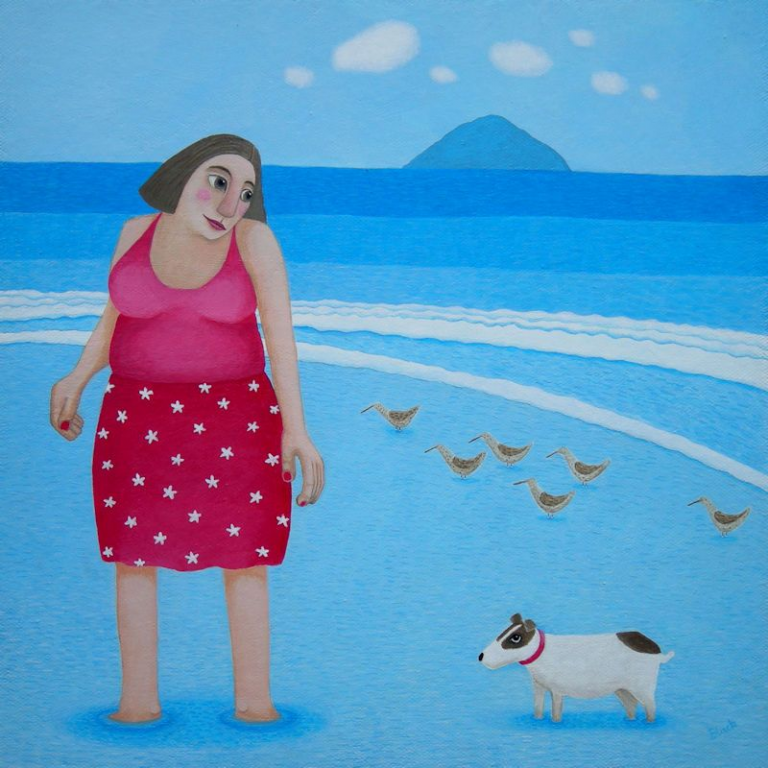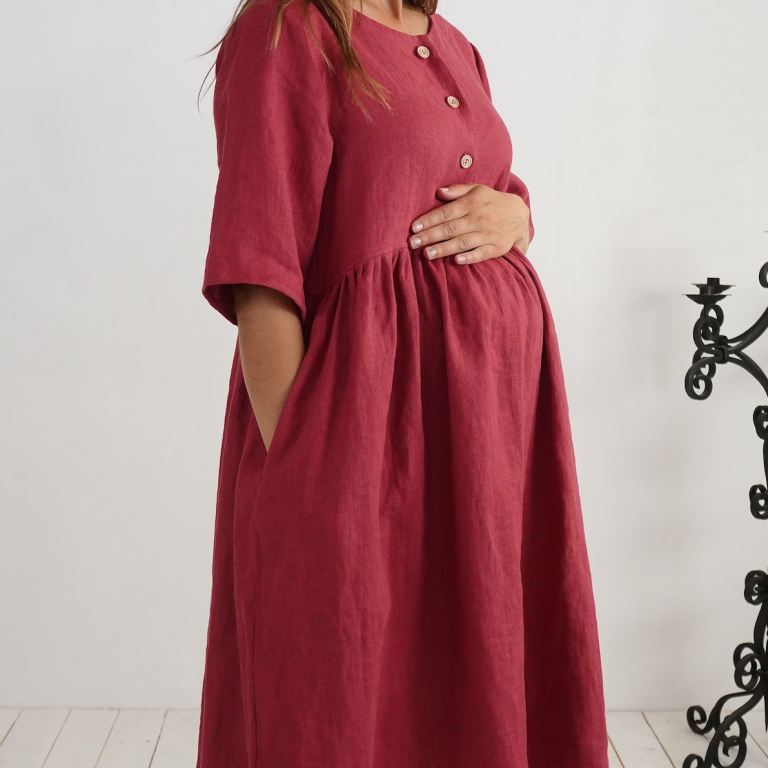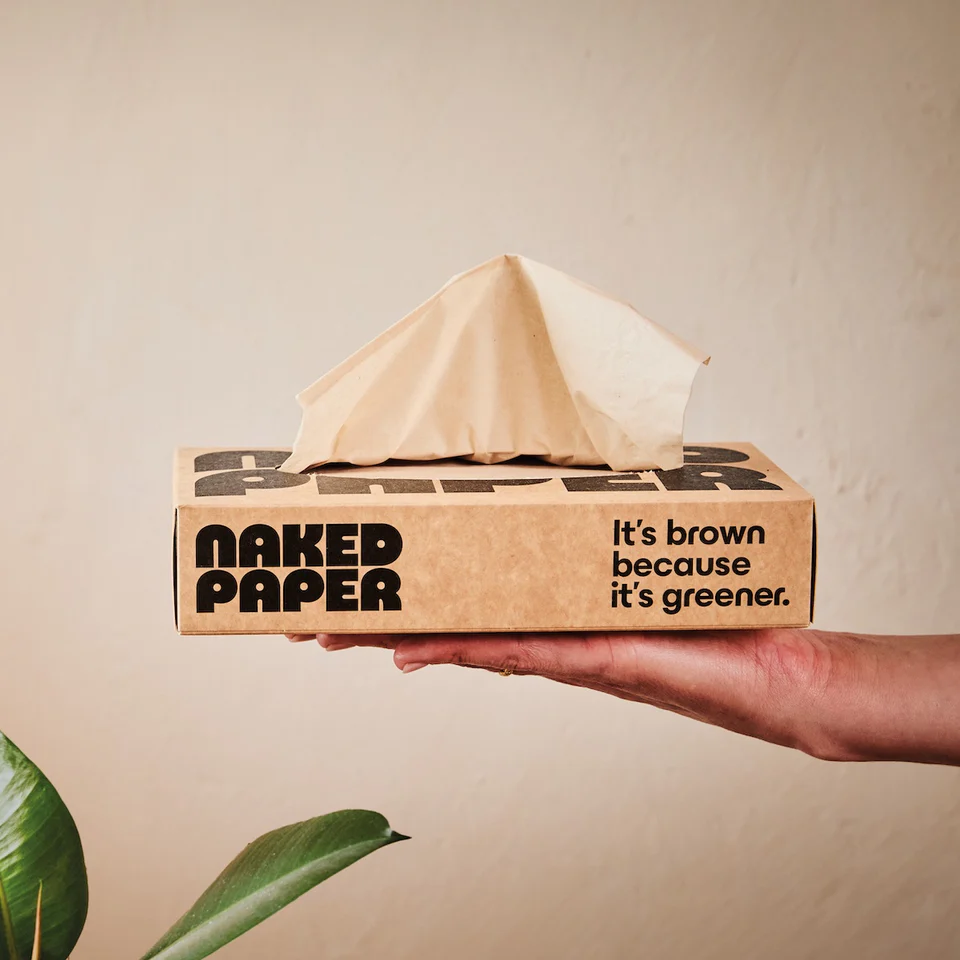
Naked Paper (use code englandnaturally for 10% discount)
If your household goes through boxes of facial tissues, you might not think twice about what’s packed inside that soft square. But behind each tissue is a story that connects to the largest forests on earth. Facial tissues made with virgin wood pulp, carry an environmental price, with boreal forests often taking the biggest hit.
These forests are a natural climate solution, richer in carbon and wildlife than most people imagine. Luckily, there’s a growing wave of eco-friendly tissue options that tread lighter and protect forests for future generations.
Environmental Impact of Facial Tissues
Conventional tissues offer convenience but at a cost to nature. Most mainstream tissues use virgin wood pulp harvested from forests across North America and northern Europe. This leads to deforestation, harming ecosystems and adding greenhouse gases to the air.
The factory process doesn’t stop at cutting trees. It uses large amounts of water, emits CO₂, and relies on bleaching agents and chemicals to perfect that pristine white look. As these tissues break down in landfills, more carbon releases into the air, magnifying the problem.
The Hidden Cost: Boreal Forests and Tissue Production
Boreal forests stretch like a green crown around the earth’s upper latitudes, acting as a massive carbon sink. These forests store more carbon per acre than nearly any other ecosystem. The tissue industry has a silent effect: each year, it clears millions of trees from these regions that might take centuries to regrow.
Habitats for bears, owls and endangered caribou vanish with every hectare felled, while the soil’s ability to hold carbon nose-dives. The result isn’t just lost wilderness but increasing threats to the global climate as stored carbon returns to the atmosphere.
Forest-Friendly Alternative Tissues
Many brands now offer tissue products that spare old-growth forests and give consumers more earth-friendly ways to stay healthy. Each alternative has different benefits, depending on your budget, lifestyle and environmental priorities.
Recycled Paper Tissues: Closing the Loop
Recycled paper tissues cut demand for virgin wood pulp. They use paper that’s already served a purpose, whether office paper or post-consumer waste. With less energy and water needed for processing, these tissues help slow tree loss while using up to 50% less carbon.
You might notice a slightly different texture, sometimes less silky. But the environmental savings make up for a minor shift in feel, especially for those looking to reduce their impact.
Naked Paper (recycled paper facial tissues)
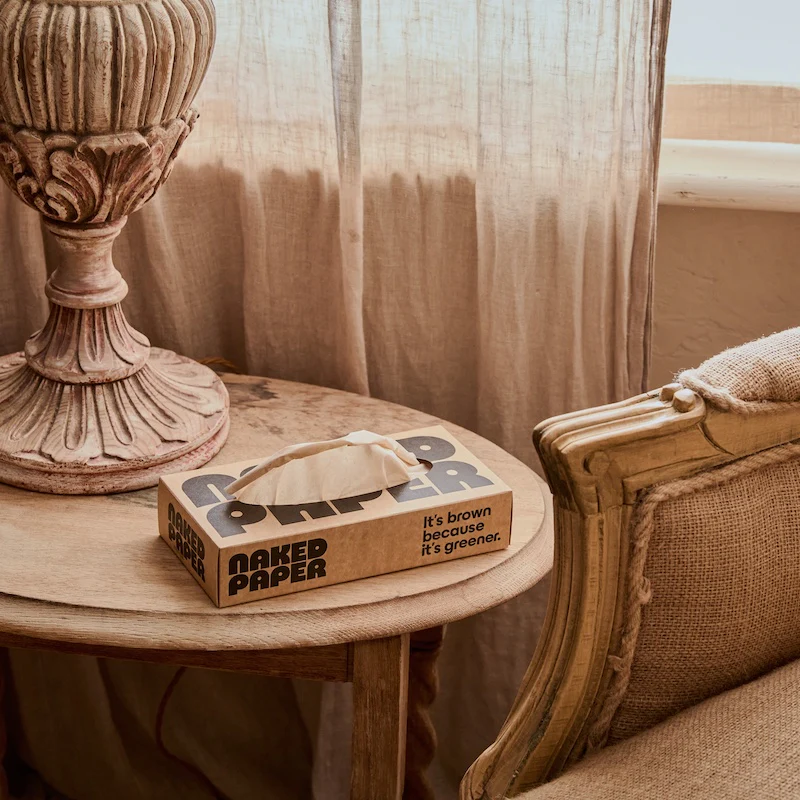
Naked Paper (use code englandnaturally for 10% discount) is a super eco-brand, offering recycled paper facial tissues, kitchen roll and bathroom tissue, all sold in zero waste packaging.
These super-soft 2-ply tissues are free from scent, and cost the same per tissue as leading brands.
Serious Tissues (made from cereal boxes!)

Serious Tissues offers quality paper tissues as nice on your nose as premium brands, but these are made from 100% recycled paper, in plastic-free packaging. As well as being free from dyes or scents, these tissues are produced in the Midlands, creating employment for local people.
Made from old cereal boxes and newspaper), each delivery includes 6 packs of 72 tissues, in thick 3-ply size. The tissues are naturally off-white, using a non-chlorine bleaching agent to remove colour from recycled magazines and documents. Save 10% on monthly deliveries.
The company can also supply wholesale to doctor surgeries, hospitals, offices, hotels etc. The brand was founded by four fathers (collectively to eight children), who wished to do something to help. A tree is planted for each box sold (a million trees and counting) to store carbon and provide homes for wildlife.
At the website, you can subscribe online for big savings (you can pause or cancel anytime). This works out way more affordable than buying separate boxes in shops. And it’s good to have them on standby, as you never know when you’re going to get a cold!
Just bin these tissues for hygiene to naturally break down. Don’t flush them (they are thicker than toilet paper and could clog drains, and cause fatbergs and garden floods (which will not make you popular with your neighbours).
Just what you need for colder weather. A strong tissue to contain your sneezes!
Great quality.
Recycled Paper Facial Tissues (for strong sneezes!)
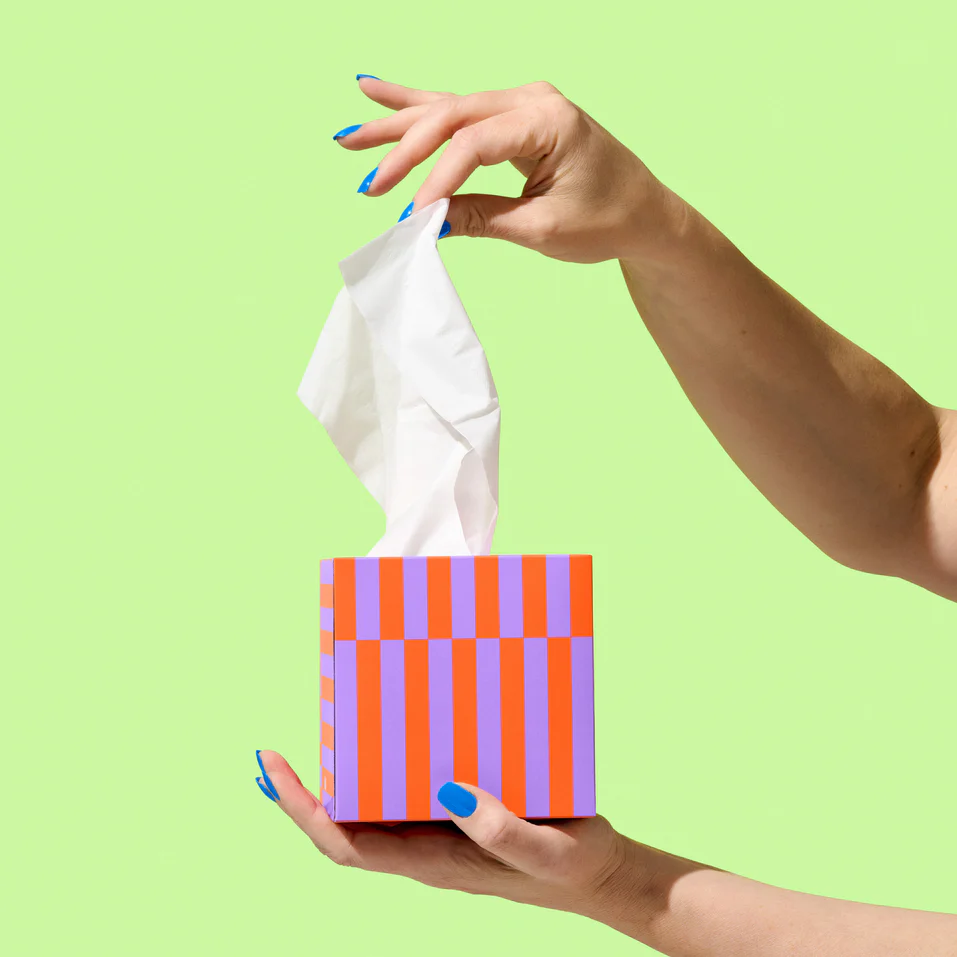
Who Gives a Crap? sells these fab paper tissues, made from post-consumer waste, and sold in colourful cardboard boxes. Known mostly for its recycled paper toilet roll, it’s now ventured into making a few other products, to stop deforestation for simple household products.
And this company donates 50% of profits to sanitation projects abroad, so that people have access to clean hygienic toilets.
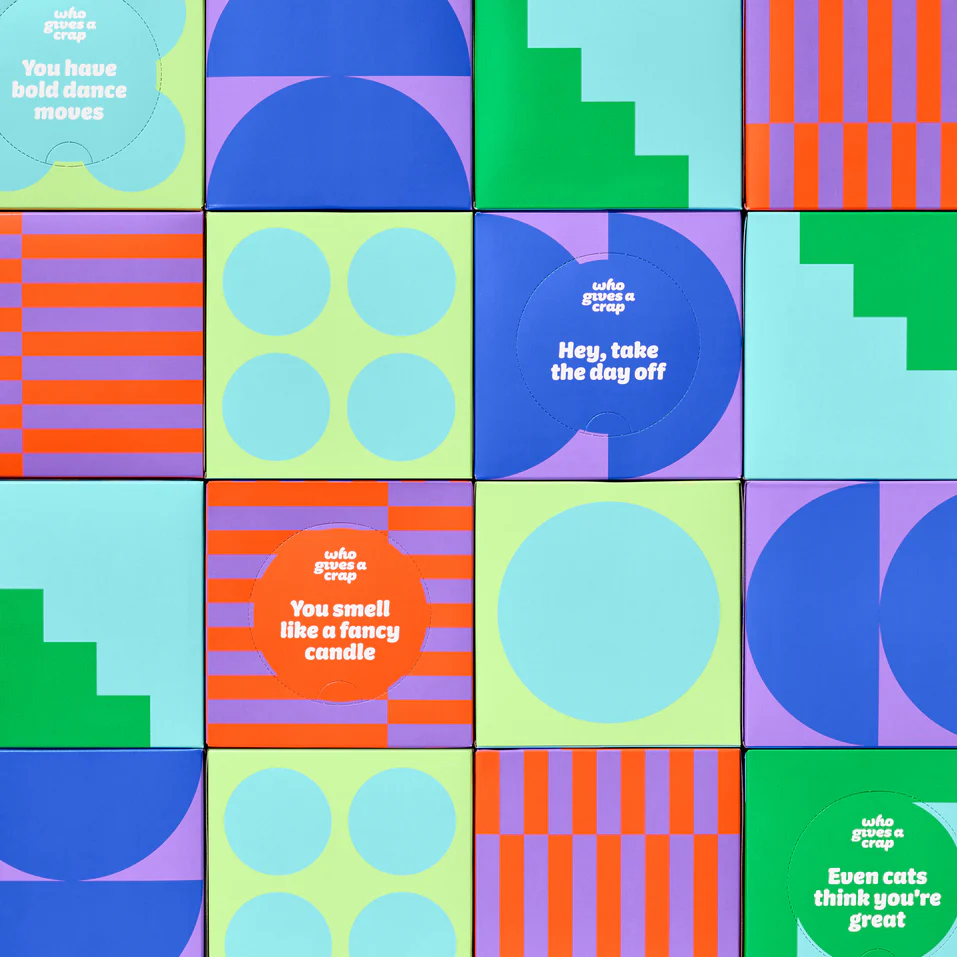
Sold in boxes of 66 tissues, these are are free from scent and dye, and are strong 3-ply (the company says they are so strong, they can cope with the strongest sneezes – even ones that sound like a mini-scream!
At the website, you can buy 12 boxes for £18.00 (66 strong tissues each). And as we all know, a strong tissue means less tissues used). And shipping is free on most orders over £20.
Just bin these tissues for hygiene to naturally break down. Don’t flush them (they are thicker than toilet paper and could clog drains, and cause fatbergs and garden floods (which will not make you popular with your neighbours).
They are good for cold winter season.
The tissues are lovely and soft, gentle on the nose. The boxes are bright and fun.
Bumboo: Boxes of Bamboo Facial Tissues
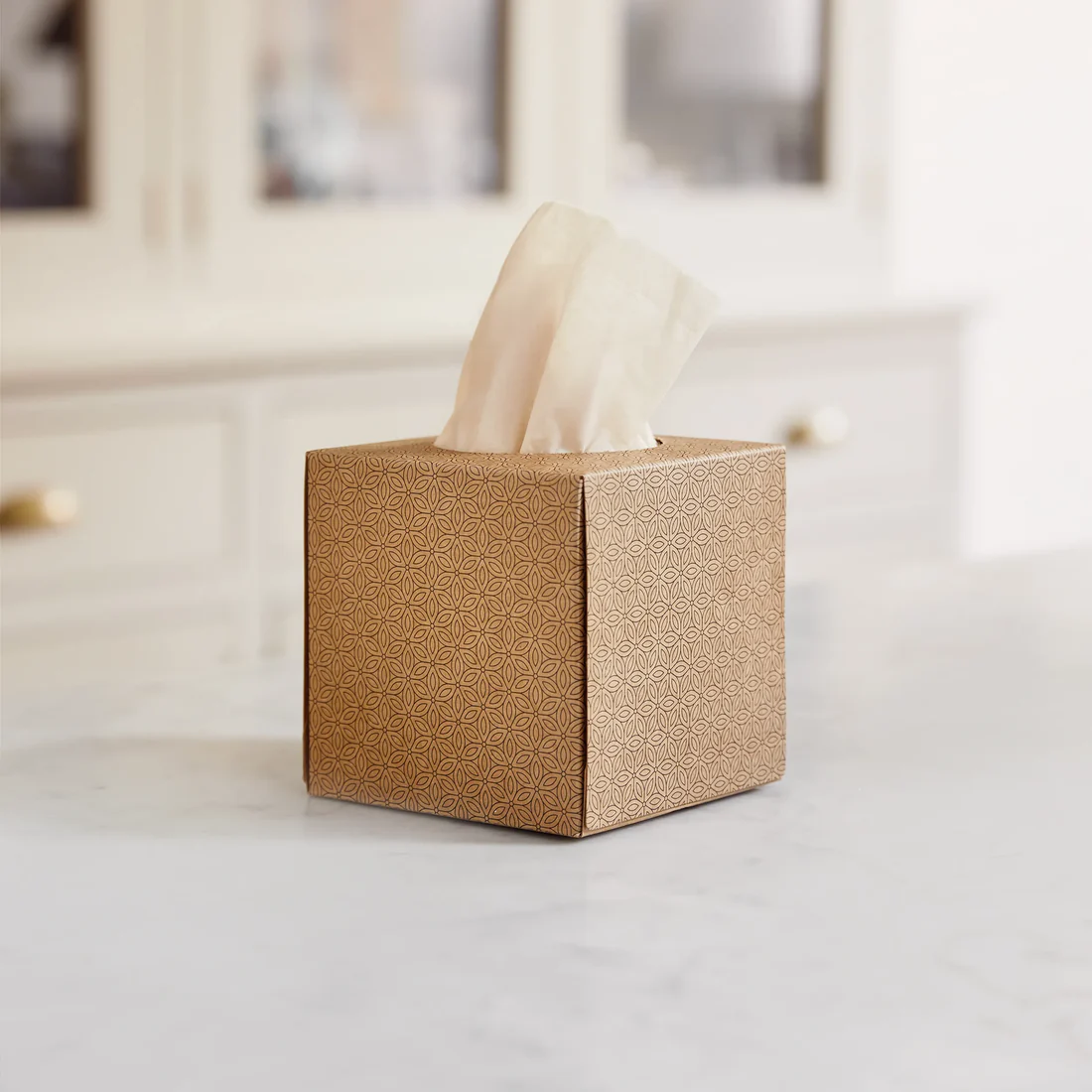
Bumboo Facial Tissues are made from bamboo, 70 sheets per box for teary or sneezy moments. For each sheet you buy from them, they wild double that area in nature.
Bamboo offers a refreshing change from hardwood tissue products. It grows quickly, sometimes up to a metre a day, without the need for fertilisers or re-planting. Bamboo’s root system stays in place after harvest, holding soil and carbon. Its growth pulls in carbon dioxide even faster than young trees.
Industrial bamboo is not the same as fresh shoots, eaten by pandas. It’s not local, but the plants grow so fast, that as soon as they are harvested, new shoots spring right up, so it’s much better than chopping down trees, which often have to grow for 30 years, before harvesting (and are often home to birds and native wildlife).
Reusable Cotton Handkerchiefs
The old-school handkerchief is making a comeback. Washable, long-lasting and totally plastic-free, a cotton or bamboo handkerchief can reduce your household waste almost to zero. They’re handy for daily sniffles, much cheaper over time and skip the need for disposable packaging.
Switching to organic cotton hankies is an effective ‘small swap’ idea. Organic cotton uses 91% less water than conventional cotton and is super-soft on your nose (important when you’ve got the sniffles!)
Some worry about hygiene, but regular washing at high temperatures keeps handkerchiefs fresh and safe. For those ready to commit, this is the gold standard for reducing tissue waste.
Luxury Organic Cotton Reusable Tissues

This pack of reusable organic cotton tissues is sold in a pack of five, made from durable organic cotton squares. Keep them neatly together in a handy cotton mesh drawstring bag, available to buy alongside. Packed in a paper belly band.
LittleLeaf: Organic Cotton Handkerchiefs
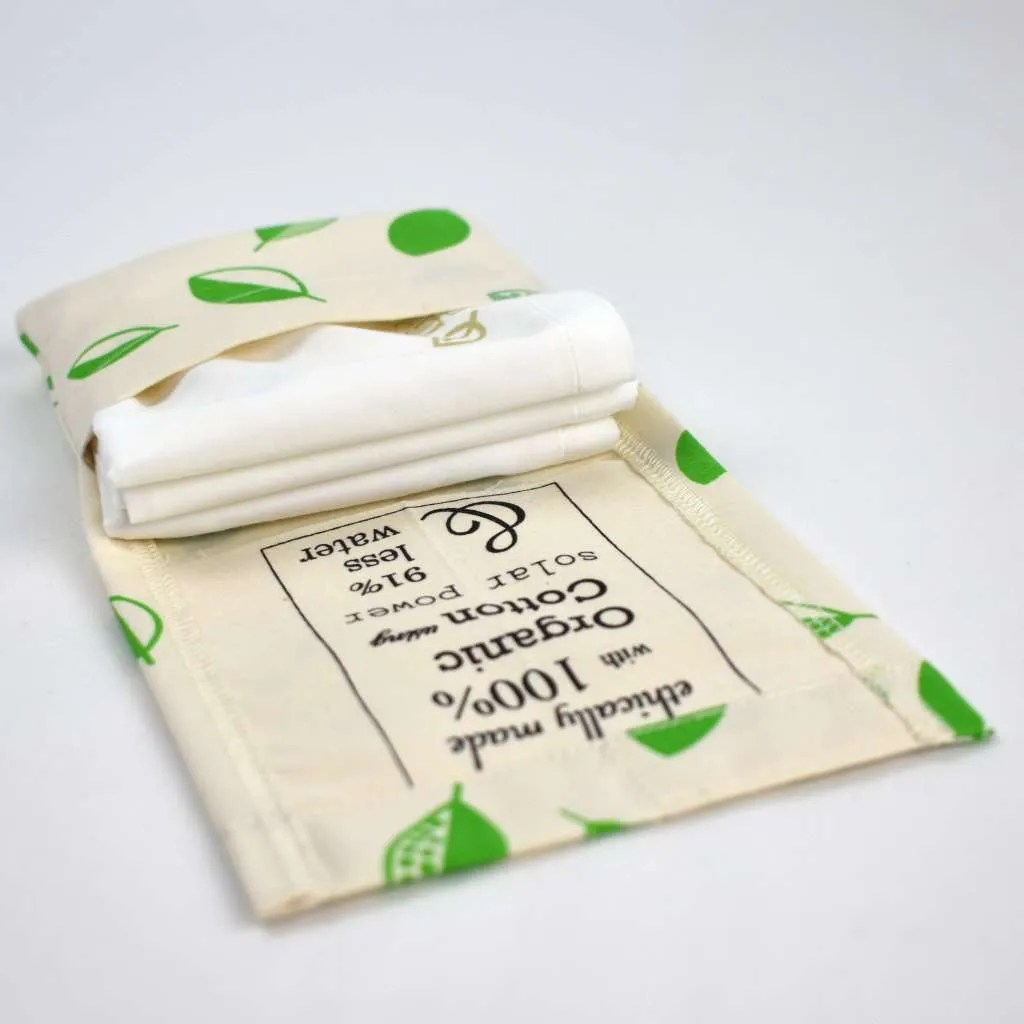
LittleLeaf Organic makes nice organic cotton hankies (also sold in a set of 9). Made with solar power, and sold in recycled cardboard boxes. These hankies are sold in a variety of cute designs including bicycles, turtles and gardening. You can also buy sets of three hankies in a box (including a festive Christmas edition with trees).
The family packs contain 9 hankies and make a great affordable zero waste gift. Each one has a discreet LittleLeaf organic logo in the corner.
You can also use them to wipe your face in hot weather or mop up little spills, then just throw them in the wash (where due to natural materials, they won’t release microplastics in the machine). They’re even made in a solar-powered factory!
Hankybook: ‘Pages’ of Organic Cotton Hankies
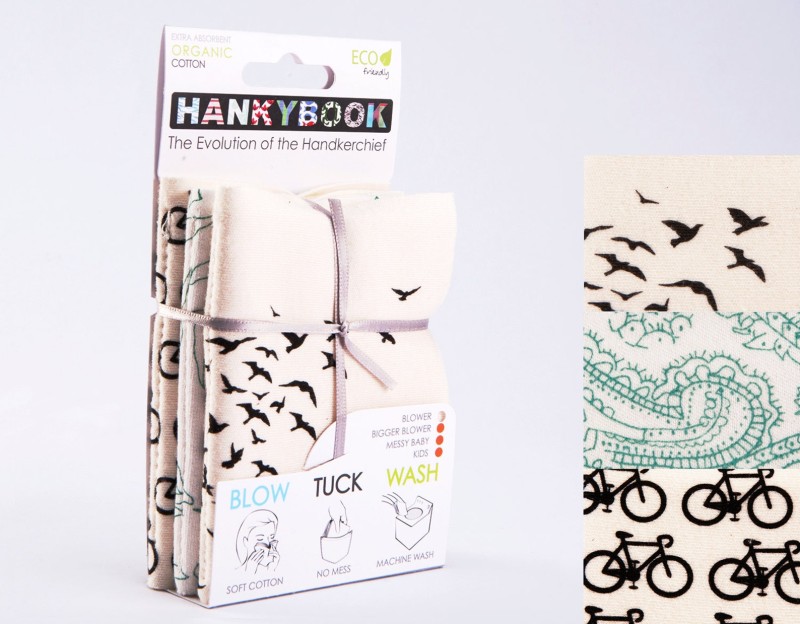
HankyBook has reinvented the handkerchief! This compact ‘book’ of soft organic cotton ‘pages’ with a protective outer cover was invented by an engineering student. Just ‘turn the page’ for a fresh hanky! Made in San Diego (USA), you then just ‘pull the pages apart’ to wash in the machine.
Also good to stop fogging up your glasses or deal with running make-up, the protective cover keeps your hands, pockets and bag clean, and helps to prevent infection. Although it’s made abroad, there’s nothing like it (yet) in England, and one purchase should last years.
An Organic Cotton Tissue Dispenser

LastTissue (USA) is an invention designed to replace 3000 single-use paper tissues. The silicone case contains 6 organic cotton handkerchiefs that are easy to retrieve and stash. Then wash and use again.
To use, just pull a tissue from the dispenser, which features a hygienic way to separate clean and used tissues. After blowing your nose, just place it in the top.
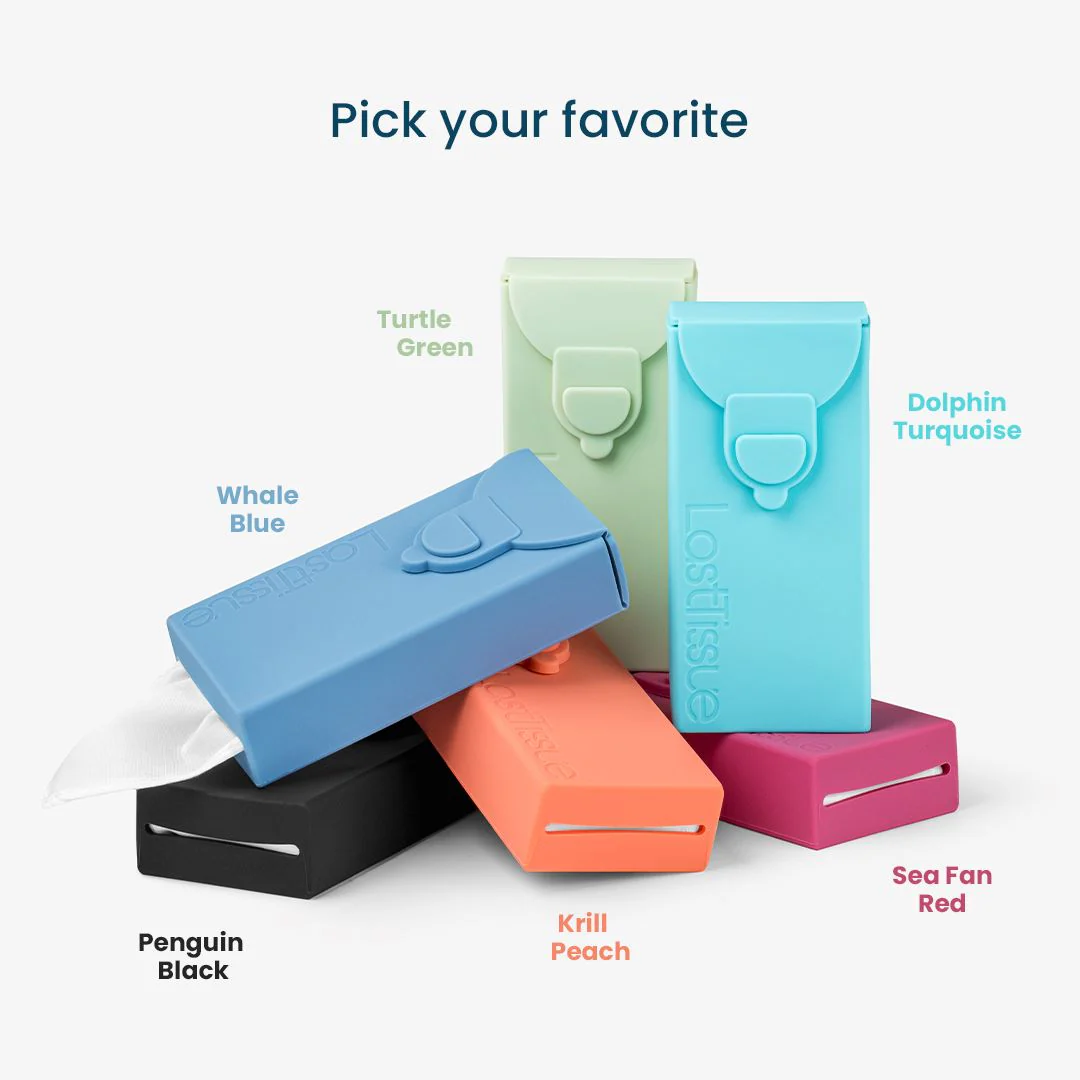
Designed to break even on carbon emissions after 72 uses, the thick tight-woven cotton absorbs well so it doesn’t get damp, and the material gets softer with use. Launder in a mesh bag, to stop them getting cost in the machine. You can clean the case in the dishwasher or with hand sanitiser.
How to Safely Blow Your Nose
If you have a cold or bunged up nose, here’s how to do it – advice from the expert to prevent making your ears pop, rupturing blood vessels, or forcing air into your middle ear (not good).
- Place one finger against one nostril and apply pressure.
- Take a gentle breath, then gently blow the other side of your nose, into the tissue.
- Then do the same on the other side.
- Then wash your hands, avoid passing germs onto others.
Conclusion
Choosing forest-friendly facial tissues helps protect irreplaceable woods, cut carbon emissions and lower waste. Whether you opt for bamboo, recycled paper or reusable handkerchiefs, every small change adds up.
Switching your tissue brand or habits is a simple step towards better forest protection, leaving our air, water and wildlife in better shape for the next generation. Let your daily routine support the forests that support all of us.
LastTissue: The Reusable Organic Tissue Pack
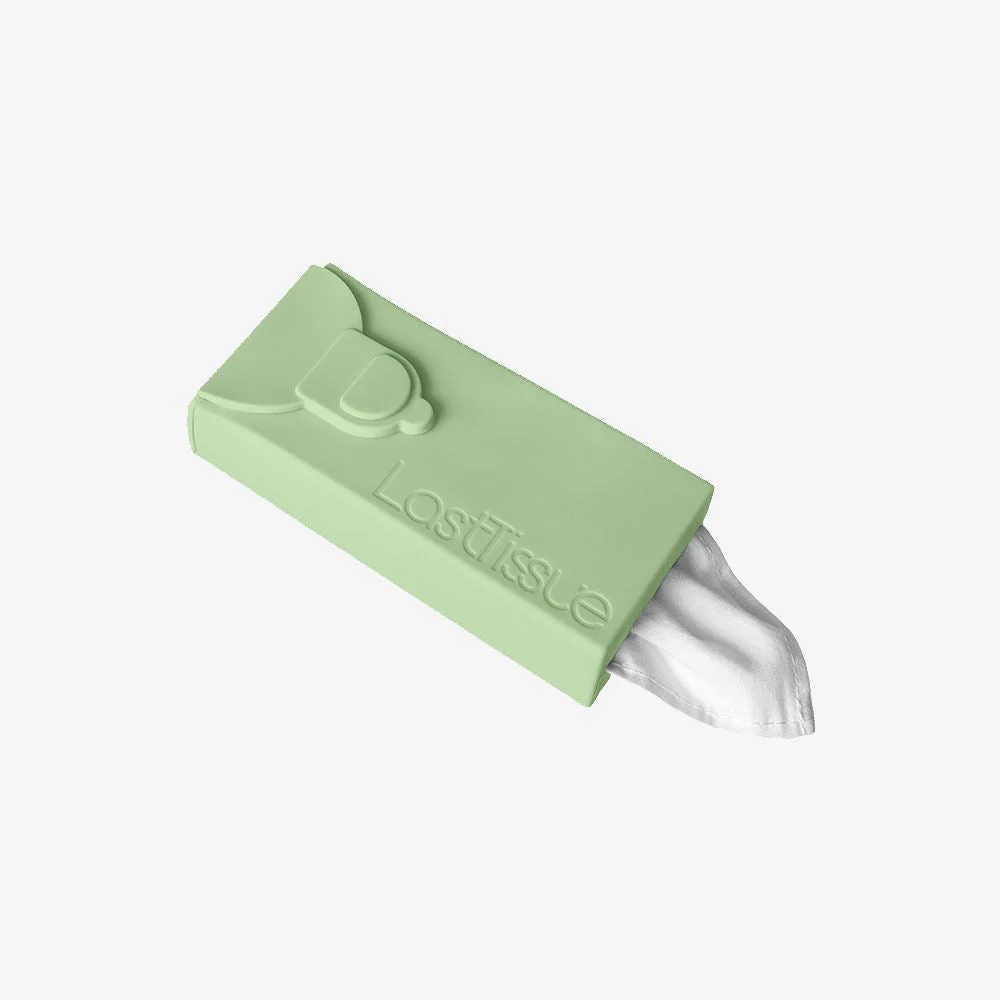
What if the tissues in your pocket did not end up in the bin after one sneeze? Disposable tissues add up fast, at home, at work, in the car. LastTissue offers a clean break from that routine. It is a simple, reusable pack designed for modern life, with strong hygiene features and a soft touch.
This compact set holds six organic cotton handkerchiefs inside a durable silicone case. The materials are vegan, the process is cruelty free, and the design is made for daily use. You get the comfort of a classic hanky without the fuss, plus a smart barrier that keeps clean and used tissues apart.
What Makes LastTissue a Smart Choice?
LastTissue is built around six GOTS-certified organic cotton tissues that feel soft on the skin, yet hold up well in daily use. Each cloth measures 19 by 19 cm, a practical size for colds, make-up touch-ups, or spills. The fabric stays gentle after many washes, which makes it pleasant to use again and again.
The case is made from BPA-free, food-grade silicone that resists wear and tear. It is flexible, grippy, and easy to clean. The case keeps your tissues neat, so nothing unravels in your bag or pocket. It also looks tidy on a desk or in a car door pocket.
A key feature is the hygiene barrier. Clean tissues slide out from the bottom opening. Used ones go back in from the top, above the barrier. Clean and used never meet. This simple detail makes it feel as easy as grabbing a paper tissue.
The pack is compact and pocket friendly, so it slips into jeans, a small handbag, or a coat pocket. You do not need a bulky pouch or separate bag. The case shape helps the tissues dispense smoothly, one at a time, which keeps the rest clean and ready.
Each pack replaces thousands of single-use tissues over its life. You get the feel of a proper handkerchief, without the mess of loose cloths. The concept was developed in Denmark, with attention to detail and materials.
How to Use and Maintain LastTissue
- Pull a clean tissue from the bottom.
- Use it as you would a normal tissue.
- Push the used tissue into the top slot, above the hygiene barrier.
Washing and care are straightforward:
- Machine-wash the tissues on a gentle cycle. Low temperatures are fine, and each tissue can be washed up to approximately 510 times.
- Place the tissues in a laundry bag to keep them together.
- Air dry for best results.
- Clean the silicone case in the dishwasher or wipe it out with hand sanitiser. You can also wash it by hand with warm soapy water.
The routine fits a busy lifestyle. Refill clean tissues whenever you do a wash, then head out with a fresh stack. No special products or tools are required.
Design Features That Prioritise Comfort and Hygiene
![]()
- 19 x 19 cm cloth size: Big enough for effective use, small enough for quick washing and drying.
- Compact case: Slim profile that travels well in pockets or small bags.
- Vegan and cruelty free: No animal-derived materials, no animal testing.
- Safe, toxin-free silicone: Food-grade material that does not shed particles or release harmful chemicals.
- Cradle to Cradle certified packaging: Thoughtful packaging that supports a circular approach.
- Long-term reliability: Durable cloth, sturdy case, and a system that separates clean from used to keep everything sanitary.
Environmental Wins of Choosing LastTissue

Switching from disposables to reusable cloth makes a measurable difference. Over its life, a LastTissue pack helps reduce CO2 by 86%, water use by 68%, land use by 87%, and energy by 80% compared with single-use tissues. Those cuts add up across daily routines at home, in schools, and at workplaces.
The pack reaches carbon break-even after 72 uses. After that point, every use avoids more emissions than it took to make the pack. Across a broad set of measures, it outperforms disposables by 8.2 times in 22 impact categories, which speaks to a well-rounded environmental benefit rather than a narrow win.
Each pack replaces over 3,100 single-use tissues. That means fewer boxes in your cupboard, less plastic wrap around those boxes, and fewer bins filled with used paper. Over time, you will see the change in your home, not just in statistics.
End of life is considered as well. The silicone case can be recycled through suitable facilities. The organic cotton tissues can be reused as cleaning cloths, then composted if they are free from harsh contaminants. Refill packs keep the case in use for years, which extends the product’s life and reduces waste further.
This is a simple shift with a big payoff. Less resource use, less rubbish, less fuss.
Comparing LastTissue to Traditional Tissues
Single-use tissues rely on trees, water, and chemicals for pulping and bleaching. Every box represents raw materials, energy, and transport. Each use lasts a few seconds, then goes to waste.
LastTissue flips that pattern. One compact pack covers daily needs with reusable cloth. You save on paper, plastic packaging, and trips to the shop. The headline savings are clear: less CO2, less water, less energy, and less land use across the life of the product.
Think about a family with colds in winter. A single pack that replaces more than 3,100 tissues takes pressure off the household budget and the bin. The result is a cleaner home and a lighter footprint, without losing convenience.
Long-Term Savings and Refill Simplicity
The cost picture is straightforward. A quality reusable pack plus refill tissues replaces dozens of boxes of disposables. Over a year or two, that shift often pays for itself. After that point, you keep saving every month you are not buying more paper tissues.
Refill packs are easy to slot into the case. Keep the case you like, refresh the tissues, and carry on. This setup supports long-term use, which is where both the savings and the environmental benefits accelerate.
Ordering is simple, with fast delivery across the UK from major retailers and the official store. Start with one pack for your bag or car, then add a second for home if you find you use them often.
How to Safely Blow Your Nose!
Blowing your nose clears mucus so you can breathe and feel better. It also keeps germs off your hands and away from others.
What you need
- Clean tissues or soft toilet paper
- Soap and water, or hand gel
Step-by-step
- Take a tissue. Fold it once so it feels thicker.
- Stand or sit up straight.
- Open your mouth and take a small breath in.
- Close your mouth. Hold the tissue over your nose.
- Press one nostril closed with a finger.
- Blow gently through the open nostril for one to two seconds.
- Stop, breathe in through your mouth, then blow again if needed.
- Swap sides. Press the other nostril closed and blow gently.
- Wipe your nose. Do not rub the skin hard.
- Put the used tissue in the bin.
- Wash your hands with soap and water for 20 seconds, or use hand gel.
Helpful tips
- Blow softly. Hard blowing can hurt your ears or make your nose bleed.
- If your nose is very blocked, try a warm drink first. Steam from a shower can help as well.
- If the skin under your nose feels sore, dab on a little plain ointment.
- If a nosebleed starts, stop blowing. Sit up, lean forward a little, and pinch the soft part of your nose for 10 minutes.
When to ask for help
- You feel pain in your ears when you blow.
- Your nose bleeds and does not stop after 10 minutes.
- You have a stuffy nose for more than a week.
Conclusion
LastTissue blends comfort, hygiene, and clear environmental gains in one neat pack. The organic cotton tissues feel good, the silicone case keeps things clean, and the routine is as easy as pull, use, and tuck away. The numbers are compelling, from deep cuts in CO2, water, energy, and land use, to a quick break-even and thousands of disposables avoided.
If you want a small change with a real effect, this is it. Choose LastTissue for your daily carry, add a refill when needed, and enjoy a cleaner routine with far less waste. Ready to switch? Explore colours and refills, check UK delivery options, and make your next tissue the last one you throw away.
Bumboo Bamboo Facial Tissue: Soft & Sustainable
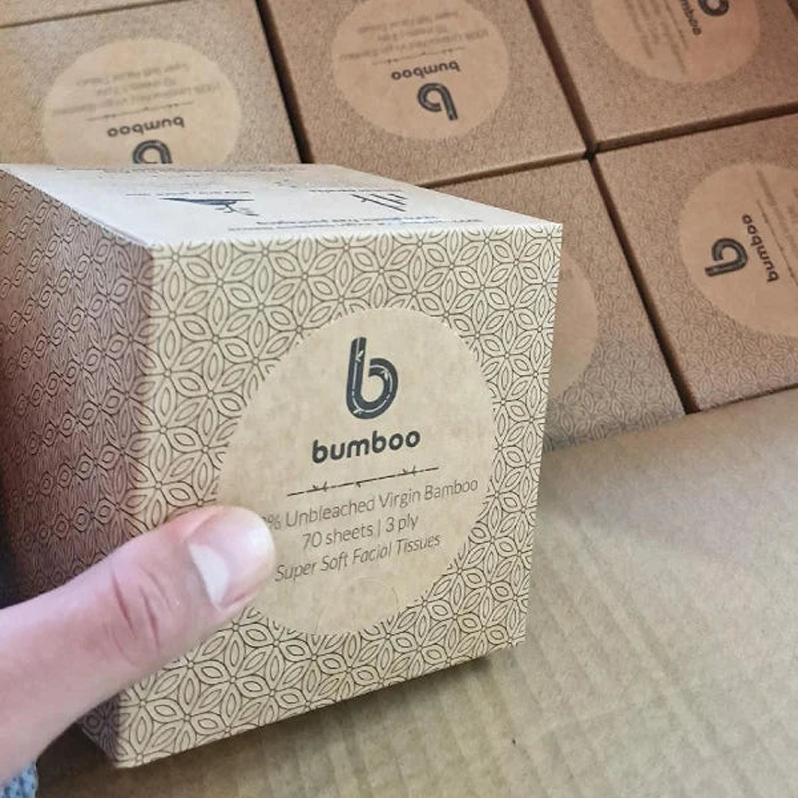
Tired of tissues that rub your nose raw or come wrapped in layers of plastic? Many standard facial tissues use tree pulp and a cocktail of inks or scents that can irritate sensitive skin. Then there is the larger cost, millions of trees felled for single‑use paper. There is a cleaner option. Bumboo bamboo facial tissue offers a soft touch, a lighter footprint, and a brand promise that puts nature first.
Made from 100% bamboo, these sustainable facial tissues are kind to your skin and kinder to the planet. They avoid harsh chemicals, inks, and dyes, so they are a smart choice for sensitive noses and allergy‑prone skin. The brand’s rewilding pledge means every sheet supports the restoration of natural habitats. That simple swipe under your nose can help restore countryside, revive ecosystems, and support wildlife.
Due to concerns that some bamboo facial tissues have been founded to be blended with acacia (deforestation concerns) or eucalyptus (flammable trees with wildfire concerns). Bumboo has independent third-party testing on its site, to confirm its facial tissues are 100% bamboo (industrial bamboo is a fast-growing grass, not the same as fresh shoots eaten by pandas).
For a more local source, recycled paper facial tissues (made from junk mail!)
Why Bamboo Facial Tissues Are Better
Standard tissues are usually made from slow‑growing trees. When demand rises, forests pay the price. Boreal forests, home to rich wildlife and vast carbon stores, are often in the firing line for pulp production. Once old trees are cut, they take decades to recover. The cycle fuels habitat loss, carbon emissions, and wider ecosystem stress.
Bamboo offers a cleaner path. It is a grass, not a tree, and grows rapidly without the need to cut down ancient forests. Well‑managed bamboo regenerates from the same root system, so the plant keeps growing after harvest. That removes the need for continual replanting and heavy soil disturbance. Bumboo uses FSC certified bamboo from well‑managed sources, which supports responsible forestry practices.
There are air quality benefits too. Bamboo can generate around 35% more oxygen compared to trees and is known to absorb significant amounts of CO2 per hectare each year. That makes bamboo a strong ally in climate‑positive design. On top of that, bamboo is naturally antibacterial and antifungal, which reduces the need for additives.
Bumboo avoids harsh chemicals, inks, and dyes across its paper range. The brand highlights food‑safe credentials on its kitchen towels, and products are PFAS‑free certified in that category. The approach is consistent across its tissues, with no “forever chemicals”, scents, or dyes. For your face, that matters. Fewer irritants, less tissue dust, and gentle fibres add up to a safer, softer experience.
The Hidden Costs of Tree-Based Facial Tissues
Tree‑pulp tissues come with a large footprint. Cutting trees for single‑use paper drives the loss of mature forest cover, which in turn disrupts habitats, pushes wildlife out, and weakens the resilience of sensitive regions like boreal forests. These areas store huge amounts of carbon and support complex food webs. When they are logged for pulp, the damage stretches far beyond what you see on the shelf.
How Bamboo Offers a Greener Path
Bamboo grows fast, regenerates naturally, and requires fewer inputs compared to tree plantations. It can produce usable fibre in a fraction of the time, which eases pressure on forests. It also produces more oxygen compared to trees and absorbs CO2 at scale, which supports climate goals.
There are practical benefits too. Bamboo fibres are naturally strong yet soft, ideal for facial tissues that need to be gentle and durable at the same time. Bumboo sources FSC certified 100% bamboo and steers clear of chemical nasties, fragrances, and dyes. The result is a purer tissue with fewer irritants and fewer hidden risks.
For those who value a trustworthy eco label, Bumboo is a certified B Corp. That status reflects high standards across social and environmental areas, and it signals a company that is measured on impact, not just profit.
Key Features of Bumboo Facial Tissues

Bumboo brings a simple promise to daily care. Make tissues that feel good on skin, avoid unnecessary chemicals, and pack them in planet‑friendly materials. The result is a facial tissue that is soft, strong, and kinder to your home and the outdoors.
Expect 100% bamboo fibres with no inks or dyes. The brand avoids harsh chemicals and “forever chemicals” across its paper range, and highlights food‑safe standards on products that touch the kitchen. Delivery is plastic‑free, using recycled cardboard boxes printed with plant‑based inks. The boxes are compostable, which reduces waste at every step.
The standout difference is impact. For every square of tissue you buy, Bumboo supports rewilding double that area. If you have seen the brand’s 48‑roll toilet paper example, that purchase supports the restoration of 288 m² of land. The same pledge applies sheet by sheet, so your facial tissues contribute too.
You also get simple shopping choices. Order once or choose a subscription for regular top‑ups. Bulk options across the range help cut packaging and transport footprints, and keep cupboards stocked without last‑minute runs.
Superior Softness and Safety for Sensitive Skin
- Gentle by design: Bamboo fibres feel smooth and soft, ideal for a sore nose or delicate skin.
- No harsh chemicals: Free from scents, dyes, and other irritants that can cause redness or dryness.
- Vegan and biodegradable: No animal products, and the tissue breaks down naturally after use.
- Family friendly: Suitable for all ages, from morning sniffles to bedtime routines.
Think of it like a cotton shirt compared to a scratchy jumper. The fibres make all the difference when skin is sore or sensitive.
Bumboo’s Commitment to Rewilding and Ethical Packaging
- Every sheet rewilds: Your purchase restores double the area of each tissue in nature. That means real land recovery, not vague claims.
- Tree planting with impact: More than 209,000 trees planted through Eden Reforestation projects, supporting jobs and ecosystems.
- Plastic‑free delivery: Recycled cardboard, kraft paper tape, plant‑based inks. The box is compostable and easy to recycle.
- B Corp certified: A mark of high environmental and social standards, with ongoing improvements and recertification cycles.
These choices turn a simple box of tissues into a meaningful purchase.
Switching to Bumboo Facial Tissues
Getting started is simple. You can choose a one‑time order for a quick restock or set up a subscription that matches your household’s pace. Subscriptions remove the guesswork, keep tissues arriving on time, and avoid emergency purchases. Bulk buying also helps reduce packaging per unit and lowers your delivery footprint.
As part of a zero‑waste routine, compost clean or lightly used tissues where facilities allow. Do not flush facial tissues, as they are made to be strong and can cause blockages. Keep an empty box for quick compost scraps and another for paper recycling, then your tidy habits match your tidy home.
Want your purchase to go further? Add bamboo toilet paper or kitchen roll to your basket and keep everything tree‑free and plastic‑free. The same brand standards apply across the range, so it is a straightforward way to reduce your overall footprint.
Subscription and Bulk Options for Effortless Eco-Living
- Flexible subscriptions: Choose delivery intervals that suit your home
- One‑time multi‑packs: Stock up in one go to cut trips and reduce packaging.
- Wrapped or naked options across the range: Keep it decorative for display or go minimal to save resources.
- Free delivery: Enjoy convenient home delivery without plastic fillers or wraps.
If you like simple systems that save time and waste, subscriptions are an easy win.
How to Safely Blow Your Nose!
Blowing your nose clears mucus so you can breathe and feel better. It also keeps germs off your hands and away from others.
What you need
- Clean tissues or soft toilet paper
- Soap and water, or hand gel
Step-by-step
- Take a tissue. Fold it once so it feels thicker.
- Stand or sit up straight.
- Open your mouth and take a small breath in.
- Close your mouth. Hold the tissue over your nose.
- Press one nostril closed with a finger.
- Blow gently through the open nostril for one to two seconds.
- Stop, breathe in through your mouth, then blow again if needed.
- Swap sides. Press the other nostril closed and blow gently.
- Wipe your nose. Do not rub the skin hard.
- Put the used tissue in the bin.
- Wash your hands with soap and water for 20 seconds, or use hand gel.
Helpful tips
- Blow softly. Hard blowing can hurt your ears or make your nose bleed.
- If your nose is very blocked, try a warm drink first. Steam from a shower can help as well.
- If the skin under your nose feels sore, dab on a little plain ointment.
- If a nosebleed starts, stop blowing. Sit up, lean forward a little, and pinch the soft part of your nose for 10 minutes.
When to ask for help
- You feel pain in your ears when you blow.
- Your nose bleeds and does not stop after 10 minutes.
- You have a stuffy nose for more than a week.
Conclusion
Bumboo bamboo facial tissues bring together three essentials, sustainability, softness, and real‑world impact. The fibres are gentle on sensitive skin, the materials avoid harsh chemicals, and the packaging is plastic‑free and compostable. Behind each box sits a clear pledge to rewild double the area of every sheet and a B Corp badge that signals high standards.
Ready to switch from tree‑based tissues to something cleaner and kinder? Try Bumboo bamboo facial tissues and turn a daily habit into a positive choice for your home and the planet. Explore the range, set a subscription, and let your next tissue support living landscapes.

